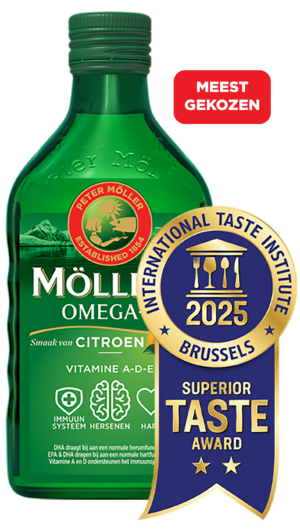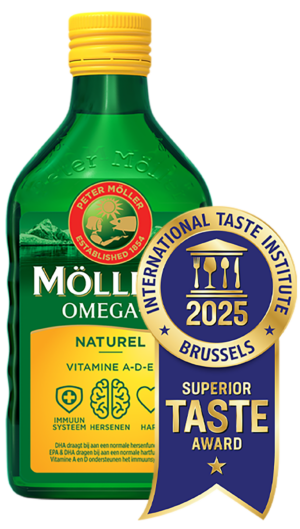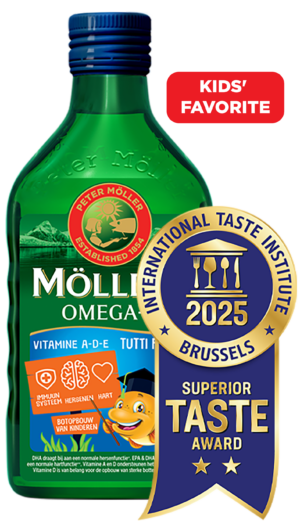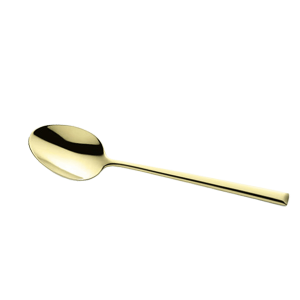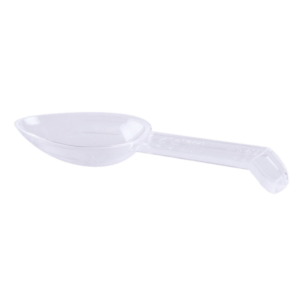Frequently asked questions about cod liver oil
There are many stories about cod liver oil. Some are true and others are not. We will answer frequently asked questions concerning cod liver oil below.
Cod liver oil’s taste used to be very bad, is that still true?
Many still remember the bad taste of cod liver oil in the past. The taste of cod liver oil becomes bad (rancid) of when exposed to oxygen and light for a certain time (oxidation). Nowadays, better production techniques are available to prevent this. Möller’s uses fresh fish for its cod liver oil. The oil is then processed and cleaned mildly (without the use of chemicals) in a low-oxygen environment. Additionally, vitamin E is added to the oil, which further protects the oil from oxidation. This ensures Möller’s cod liver oil to taste neutral and fresh.
Recently, we even won the Superior Taste Award 2020 for taste and quality of Möller’s cod liver oil, from the renowned International Taste and Quality Institute! A jury of 135 experts appreciated the taste of Möller’s cod liver oil as remarkable and this was awarded with the Superior Taste Award.
Is cod liver oil made of whale?
In the past some cod liver oils were made of whale. Möller’s cod liver oil has existed since 1854 and has always been and still is fully obtained from the Arctic cod. This cod is sustainably caught and is naturally rich in vitamin A and D and omega-3.
Are there any differences between the different types (brands) of cod liver oils?
Cod liver oil is a type name. There are different types of cod liver oil on the market. These may differ in taste, nutritional values and purity. Differences in taste may be due to differences in mode of production (whether or not in an oxygen-free environment, way of purification), the recipe (for example whether or not vitamin E is added to the oil) and the fish species used. Look for the nutritional values on the label of the particular product and pay special attention to the amount of ‘DHA and EPA’ omega-3 fatty acids. These fatty acids have been scientifically proven to be beneficial for health.
In the past cod liver oil was taken for vitamin A and D, are these still in it?
It is true that in the olden days the cod liver oil was mainly consumed because of the vitamins A and D. These vitamins are still richly present in Möller’s cod liver oil.
Over the past few decades, many scientific studies have shown the benefits of omega-3 for our health too. Möller’s cod liver oil is, besides vitamin A and D, also rich in omega-3. As a result, Möller’s cod liver oil is now also taken as an omega-3 supplement.
Cod liver oil is a product of the past, wouldn’t it be better to take regular fish oil capsules nowadays?
Regular fish oil capsules naturally contain omega-3 fatty acids, but vitamin A and D are lacking. Cod liver oil offers the unique combination of natural vitamin A and D and omega-3. Furthermore, the omega-3 fatty acids in cod liver oil have their natural triglyceride form, which ensures a better absorption than the absorption of ethyl esters occurring in regular fish oil capsules.
In addition, Möller’s cod liver oil (omega-3 fish oil) contains a higher dose of omega-3 fatty acids DHA and EPA in relation to many other fish oils. Per dessert spoon Möller’s supplies 1.000 mg DHA and EPA omega-3 fatty acids. In order to ingest this amount of omega-3 fatty acids, it would take multiple fish oil capsules.
In production of regular fish oil capsules, the whole fish is used, while Möller’s only uses the cod liver. The reason for this is that the liver is very rich in omega-3 and vitamin A and D, compared to the rest of the fish. The rest of the fish is used for consumption.
Frequently asked questions about Möller’s
What is the difference between Möller’s cod liver oil and Möller’s Double capsules?
The most important difference between liquid cod liver oil and omega-3 capsules is that cod liver oil is made from fresh liver of Arctic cod. The oil of the Double capsules is made from oil obtained from fatty fish, such as anchovies and sardines from the southern part of the Pacific Ocean. A second difference is that cod liver oil contains vitamin A and D naturally. These are added to the Double capsules. The omega-3 fatty acids DHA and EPA are found in both cod liver oil and capsules. Cod liver oil contains more DHA omega-3 fatty acids, but the Double capsules contain more EPA.
Should the Möller’s products be taken with food?
No, Möller’s cod liver oil and capsules don’t have to be taken with food. The moment you take the products depends on what you like most, which varies from person to person. We advise to take the products always at the same time of the day. We also recommend to take the products at breakfast, when omega-3 fatty acids are absorbed optimally by the body.
Do Möller’s products contain soy or gluten?
No, none of our products contain soy or gluten. The only allergen that is present in Möller’s is fish.
Is the gelatine in Möller’s Double capsules halal?
Yes, the gelatine has been derived from bovine sources and this gelatine is halal-certified.
Frequently asked questions about use during pregnancy, breastfeeding and for babies
Now that I am pregnant, can I take Möller’s cod liver oil?
Yes, Möller’s cod liver oil is recommended for pregnant women. Möller’s cod liver oil is rich in vitamin D and the essential omega-3 fatty acid DHA. Vitamin D is important for the absorption of calcium which supports the bone development of the baby. Möller’s cod liver oil offers the daily recommended intake of vitamin D for pregnant women of 10 micrograms per day.
The omega-3 fatty acid DHA helps the development of the brain, the nervous system and the vision function of your baby (this beneficial effect is obtained with a daily intake of 200 mg DHA by the mother, in addition to the recommended daily intake of 250 mg DHA and EPA).
Möller’s cod liver oil also contains 250 micrograms of vitamin A per daily dosage. Vitamin A plays an important role in the fetus’s growth. Therefore, sufficient vitamin A during pregnancy is essential, but an excess of this vitamin should be prevented. Do not eat too many vitamin A-rich products during pregnancy, such as liver, pate and liverwurst. One slice of pate contains, for example, 350 micrograms of vitamin A. The recommended daily intake (RDI) of vitamin A during pregnancy is 1.000 micrograms per day (the maximum safe dose for pregnant women is 3.000 micrograms per day). Möller’s fish oil contains 250 micrograms vitamin A per dessert spoon and is therefore a safe amount during pregnancy.
Can I use Möller’s cod liver whilst breastfeeding?
Yes, Möller’s cod liver oil is recommended for breastfeeding mothers. Möller’s contains the omega-3 fatty acid DHA. DHA fatty acid is important for the development of the brain and eyes of the baby (this beneficial effect is obtained with a daily intake of 200 mg DHA by the mother, in addition to the recommended daily intake of 250 mg DHA and EPA). In addition, Möller’s cod liver oil contains vitamin A and D. These are important vitamins for the mother’s immunity.
Please note: if you are breastfeeding and you take Möller’s cod liver oil yourself, the baby still needs an extra daily intake of 10 micrograms of vitamin D. The amount of vitamin D in breast milk is not sufficient for babies.
Should I supplement my baby with vitamin D if I am breastfeeding and if I take Möller’s cod liver oil myself?
Yes, it is recommended to provide your baby with extra vitamin D from the age of 1 week. Even if you are breastfeeding and take Möller’s yourself. The amount of vitamin D in breast milk is not sufficient for babies, which is why supplementation is recommended. Vitamin D is essential for a proper bone development in babies.

